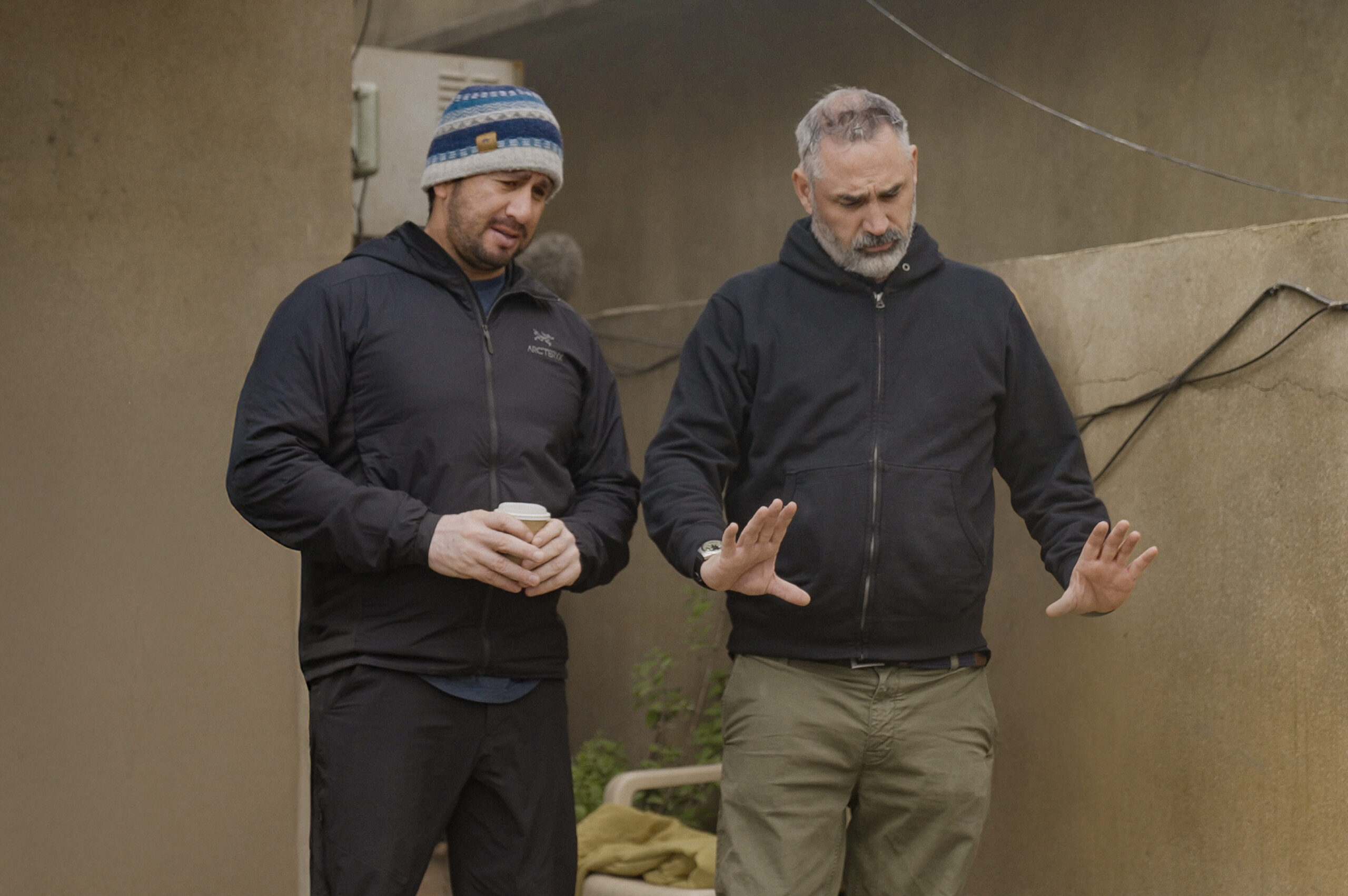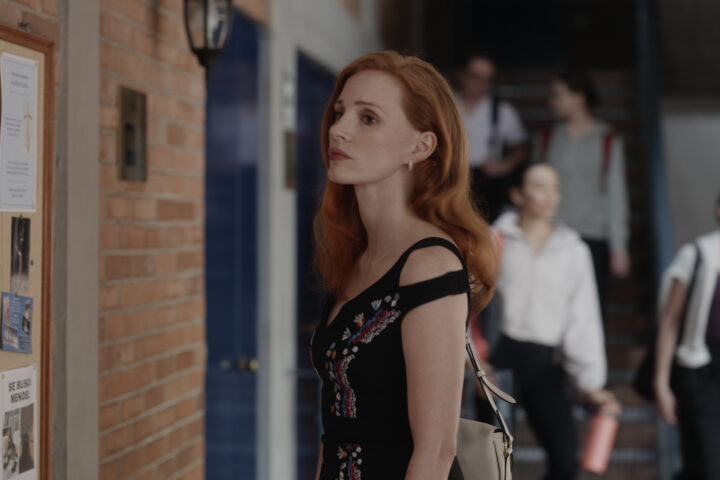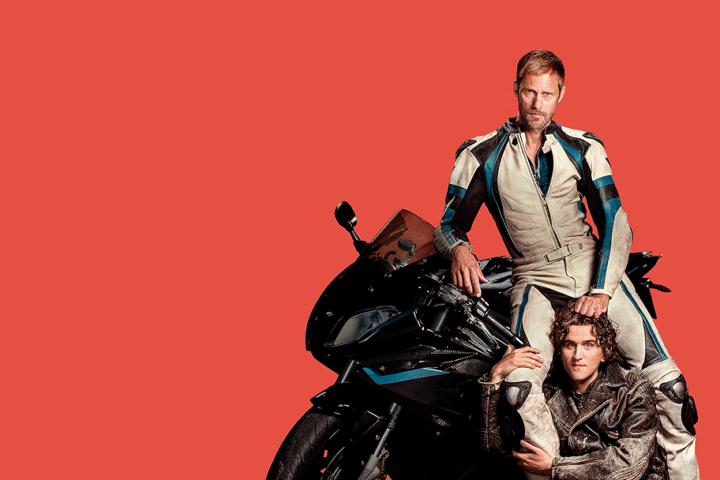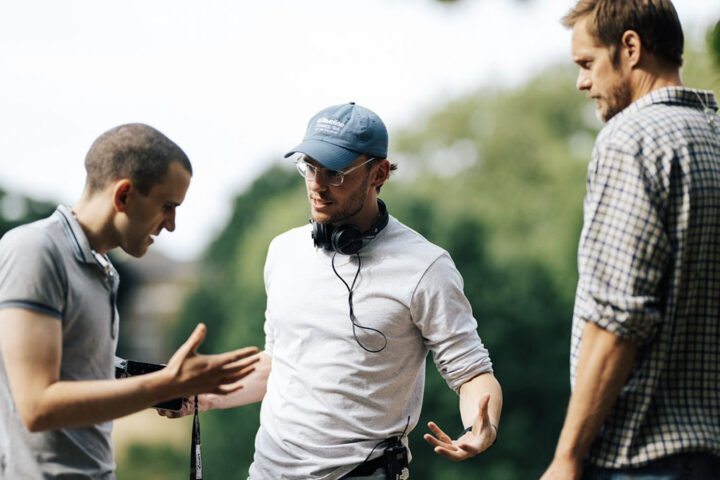Alex Garland and Ray Mendoza didn’t set out to make just another war film. After working together on last year’s provocative button pusher Civil War, their creative partnership evolved when a conversation about potential future collaborations turned into something far more personal. The resulting Warfare, about a platoon of U.S. Navy SEALS on a mission in rural Iraq that takes a fateful turn, is drawn from Mendoza’s own harrowing experience during a 2006 ambush that would irreparably alter his life and perspective. What followed between the men was a meticulous, charged dynamic, one rooted in forensic recall and a crusading desire to tell the truth about young men in combat, sans Hollywood convention.
Warfare is an economical, nerve-shredding reconstruction of the fog of war unlike anything writer-director Garland has done before—and unlike any war movie in recent memory, this time built on lived experience and with all of the chaos, and catharsis, that memory and art can bring. Warfare is a technical feat, act of remembrance and gut punch about a world with no safe zone.
I recently caught up with Garland, the genius innovator behind such sophisticated movie visions as Ex Machina, Annihilation and the screenplay for modern classic 28 Days Later, and filmmaking partner and former Navy SEAL Mendoza to reflect on how they got there, what it took and why getting it right mattered more than anything else.
Do you know you have a really good movie on your hands?
Alex Garland: We’re proud of it.
You worked together on Civil War and somewhere along the way you guys discovered there was another story to tell here, based on Ray’s lived experience, right?
Ray Mendoza: There was a type of movie that I think Alex was wanting to make. And he reached out to me to say, ‘Hey, here are the parameters and the budget we’re looking at. Do you know any stories?’ And with the “20-year war” and friends from the Ranger Regiment, SF (Special Forces) and all different Army and Marine units, there are a lot of stories. There was one story that I’ve always wanted to tell. but from an emotional standpoint I wasn’t sure if I was ready because I was going to have to go back into feelings that I had pushed down for a long time. And there’s a trust component that comes with that as you’re trying to represent the people that were there. For Elliot (Miller), who doesn’t remember it, I wanted it to be done right. And if I couldn’t do it right, I wouldn’t do it. And so with our working relationship from Civil War, I knew how (Alex) worked. There was trust and I was ready. And he was very receptive to the story.
It’s a different animal than Civil War in that it’s not a traditional a narrative. It is an exercise in visceral terror, technique and a terrific ensemble. But it’s less of a written story per se, and more a collection of memories that you were able to glean. Is that correct?
RM: It is. Yeah, we interviewed as many people as we could. I think initially, because it’s very contained, we kind of started with that as the core. With memory we all have different anchor points on things. It’s like, ‘No, that happened first, or that happened first,’ so we really had to forensically slot everyone’s memories together, which was challenging. It is very much is from their memories. For me, I have had dreams about it for 20 years and sometimes have a hard time differentiating, ‘Did that happen? Was that real?’ And so I have to constantly check myself or talk to friends: ‘Was there a dog that ran into the house? No, no. Okay, so that was a fucking dream.’ So memories are a tricky thing and with time they start to deteriorate.
Alex, can you talk about the technical side of the movie, sort of bringing the aesthetic to bear on these memories? It’s very tense. I was clocking certain moments as they happened. Twenty-two minutes in somebody says, ‘jihad,’ which raises fear that something is about to happen. At twenty-eight minutes a grenade comes through the window. And at forty-two is the IED. How about the technical intensity, including the sound design, which is pretty extraordinary? There’s a sequence after the IED where the sound goes from realism to kind of…
AG: Something slightly more abstract. The first thing I’d say is it would be wrong for me to make it seem as if I’m responsible for the sound design or any of the technical aspects, because Ray really did- we did work on this together. And I don’t think there’s anything we did that wasn’t part of a discussion. Sometimes there were things from Ray’s point of view that would not be part of a discussion because Ray would be saying, ‘This is what happened,’ and then we’d try to execute it. But then everything about how we put it together was a discussion. Ray and I started talking about it early, and we never really stopped talking about it until the film was locked and done.
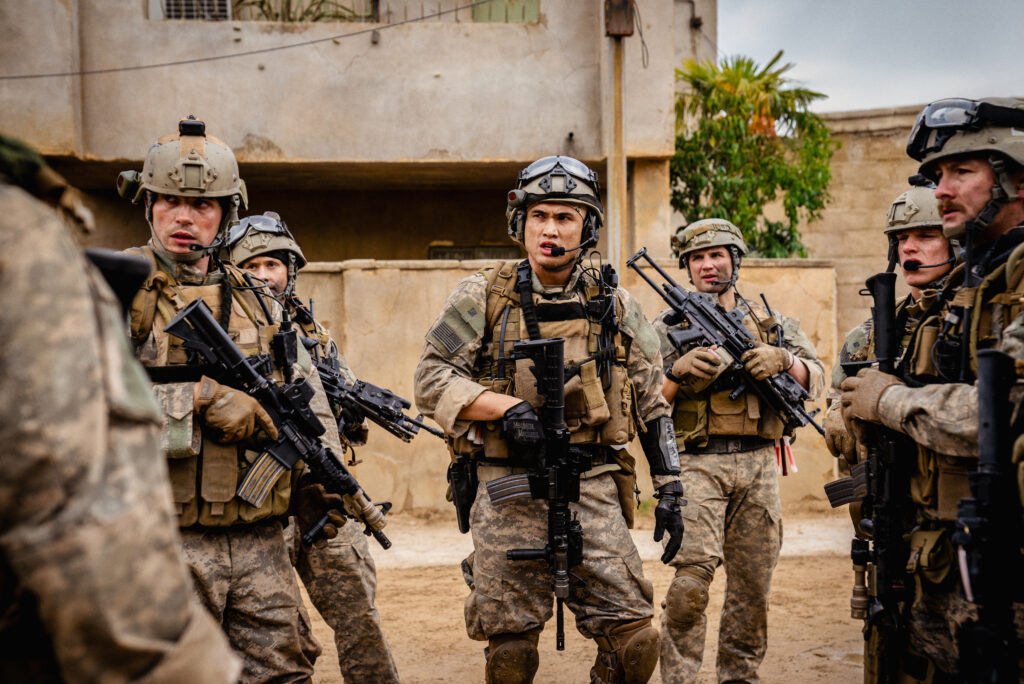
To be quite honest, a lot of my job on a technical level was easy because I was working in spaces that were super familiar to me. Ray rehearsed the actors and got them ready, and I was trying to think of, ‘Well, how do we cover this? What sort of lens should we be on?’ But this is my bread and butter; my normal working day. The tricky stuff was not the technical execution but the responsibility to get it right (because there are) strange little ways that the tricks and the bullshit of filmmaking can seep in around the edges and then subtly distort stuff. Like, when you choose to be on a close-up, are you making someone more heroic? It sounds like a silly question but actually it’s a serious one if what you’re trying to do is be accurate. These tiny things have an influence. One of the easiest ones for me was saying, ‘We’re not going to have any music in this film,’ because the music would inherently be a distortion. As a process, it’s hard to call it enjoyable but it was straightforward, and for me Ray is one of the easiest people to work with that I’ve ever encountered. The difficulty was in the responsibility.
You have eschewed the familiar tropes a war movie. They really are not here at all.
AG: Ray had a story he wanted to tell and there were a bunch of things that I knew—from my working life—that I was trying to make sure they didn’t intrude on this. There were rules. Rules are rules. We spoke to as many people as we could. We got as good of information as we could. And then we tried to repeat what we were told. And we had a rule, which was that nobody was allowed to have what we call a ‘note.’ No one was allowed to have a note who wasn’t there. I couldn’t have a note, a studio exec couldn’t have a note and an actor couldn’t have a note. An actor was not allowed to say, ‘I think I’d be motivated to go downstairs’ if (in real life) they didn’t go downstairs; ‘No, you’re just going to stay upstairs. That’s what happened, so get upstairs.’ And that probably sounds a bit fascistic (laughter). It was friendlier than that.
Ray, Alex mentioned your work with the cast. I think I read that part of the criteria for how you selected the actors was that they needed to be young and fit, but it wasn’t necessarily about the performances. You wanted them youthful. Is that correct?
RM: That is correct. A lot of it had to do with time and budget dictates a lot of things. Yeah, I wanted the youth. Oftentimes when we see war movies, because of casting and popularity of certain actors, typically they’re older; they may be in their 40s when the guy they are playing was really in his 20s or his 30s. But there’s something about the youth. I really wanted the face of the youth because that’s who goes and fights these wars. I was one of them. I think it plays to this loss of purity; loss of innocence.
Because after this day I did view life through a different lens. I had been in a bunch of gunfights and it was my second deployment, so I wasn’t a stranger to it. But what we all saw that day completely changed my lens. I was no longer that young kid. So I wanted that youth component. We did interviews and set the expectations and requirements we needed. I think the ones who just had that fire in the gut responded to it like, ‘Yes, I want to do that.’ That was the kind of person we wanted on those long, tiring days.
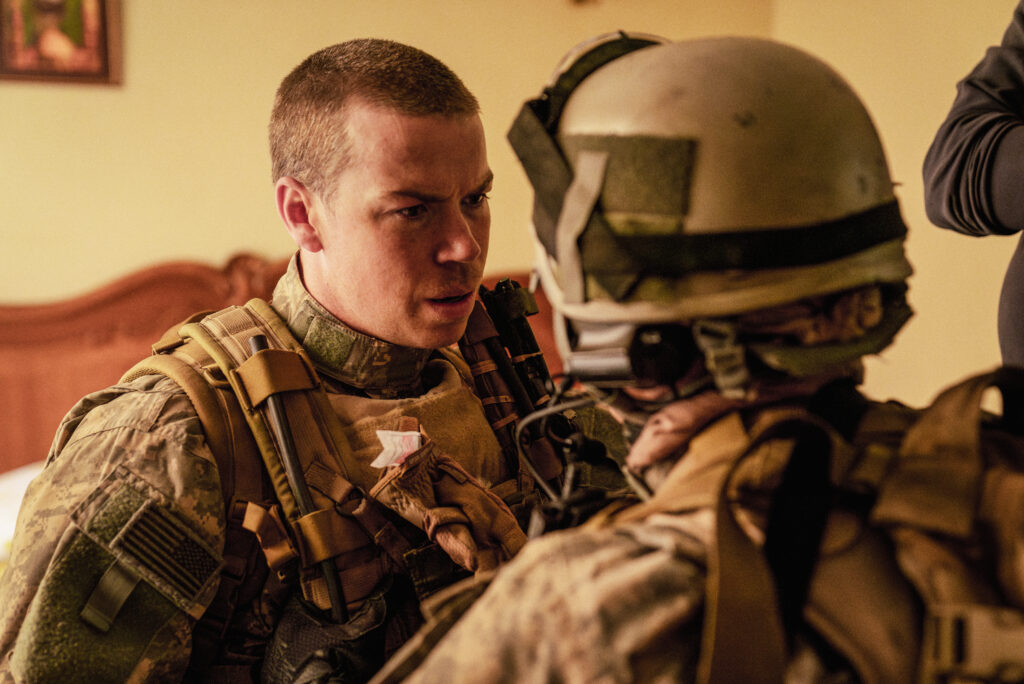
It must have been integral to cast Cosimo Jarvis. What made him right for the critical role of Elliott?
RM: He’s just a great actor, and his ability to embody the essence of who Elliot was. To show you how good (Jarvis) is, Elliot can’t speak. We have no video record of Elliot speaking. How the fuck did we not have videos of this guy? Cosmo spoke to Elliot’s dad. They’re from northern Illinois, not far from here. They sound similar. And when he showed up on set the spirit of Elliot was there. I could feel it. It sounded like it. Just through talking to his dad, he recreated Elliot. I don’t know if it was just that something came down. It was amazing. It was to the point where it was freaky for me. It was really hard. That’s where things got emotionally hard for me. How he was able to do that was incredible. With the mustache, it was more the essence that transformed his face to me. That was the new Elliot. It was a surreal moment for me.
How do you convey to that group of actors the experience of being in that moment and reality?
RM: I’d been talking to Cosmo and Joe Quinn, who play two most important roles. For actors, if you’re going to embody somebody… I think most actors don’t focus on, ‘I need to sound exactly like him. I need to be his height. I need to have the same hair color.’ What’s more important for soldiers is embodying the spirit and the essence of that person. That’s what I conveyed to all of the actors: ‘I don’t expect you to sound like my friends. I don’t expect you to be them. But I do expect you to give everything.’ If they performed a specific action and we didn’t get it right, we weren’t leaving until we did. They gave that respect to their roles. They all did.
AG: I think it’s worth saying as well that off their own backs and under their own steam, a lot of them went to meet their real-life counterparts. They spent time together. Sometimes that was on Zoom because of where people were geographically located. For the guys that could it was, ‘We’re going to get out there and just spend time.’ They way those actors are, they were looking at little stuff like how they squared their shoulders or how they relaxed. These guys are dedicated. One thing that in the group we were lucky to put together is that they were all hard workers who took their jobs dead seriously. I remember in rehearsals hearing Cosmo trying out these specifics of accent. He’d located it to one town. It was crazy.
And Ray, D’Pharaoh Woon-A-Tai played you. What was that like?
RM: I had to wear a couple hats on that one. Because I had to train them, I needed to be very specific as there’s the safety component. That was the priority because I didn’t want anyone to get hurt. We were doing very close proximity shooting; very high dynamic, fast, kinetic scenes. I had to be careful when I was training. I was one person with him then, and then when I was directing him I was a different person. So I had to hop back and forth.
But I wanted them to have an experience. I had to be this tough, big brother person because I needed to push him. I didn’t want them to ever be comfortable, including D’Pharoah. Out of all the actors, he had the most stress and pressure. I never told him he did a good job. I wanted him to be stressed out because I was stressed out. A lot of times that comes through pressure. I wanted them to feel that pressure and to use that; to remember what that feels like. But sometimes that’s hard to act, and one of the most difficult things is how to convey confusion, stress and being overwhelmed.
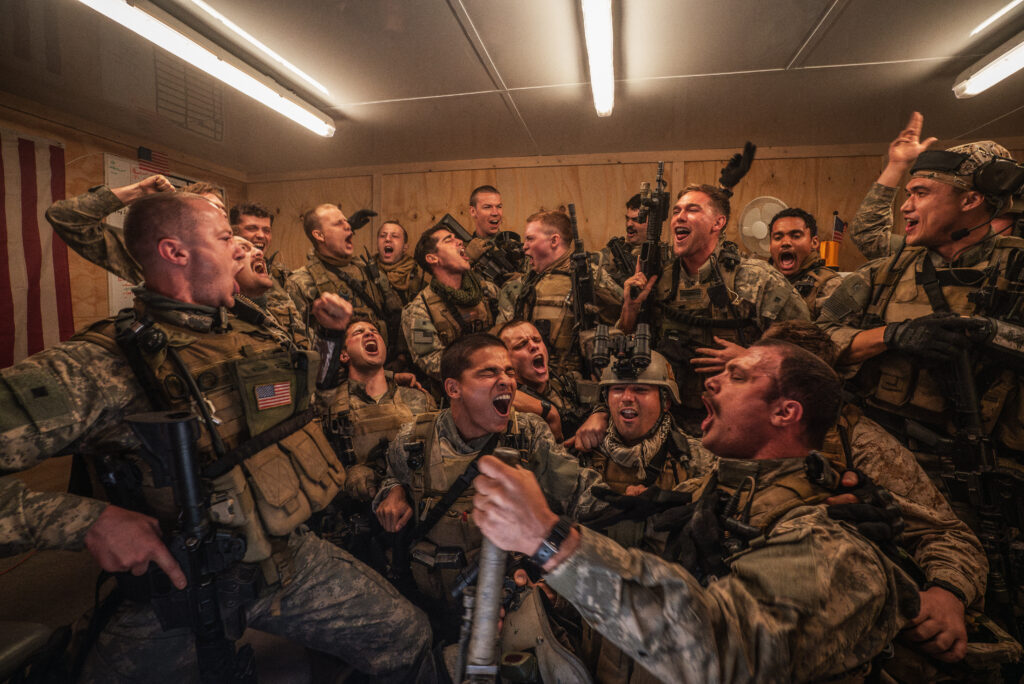
He also had the learn the complex language of the comms too, right?
RM: Correct, yeah. There are things he would hit sometimes, and it was like, ‘That was great. Now try to get this one in. There’s a piece of information you missed. Do that part too.’ And then, ‘Okay, we’re going to do it again. There’s another piece you missed. Now fucking add that part in.’ So through multiple takes it got stressful and tiring, and then he started to just let it all go, right? He started to get rid of that shit—the thinking too much—and began doing the role as I wanted him to. And so yeah, I pushed him. I pushed him really, really, really hard in every aspect of it. But he’s a little fighter; a scrapper. And so he took it on the chin, which I loved.
You built your set to scale in a studio somewhere north of London, I believe in an old World War II field. It must have helped to contain and control the action in the studio setting.
AG: Yeah, sort of abandoned airfield. Bovington. And the plan was to try as much as possible to not have a film set but to have a location. So we built a lot. We had a whole street. In fact, we had a T-junction in the street and one end had a return. There were two blue screens. One end of the street looked off to blue. So in effect, there were three places you could look and two of them had a blue screen. But there were also many, many angles where you just didn’t need a blue screen, which was kind of eerie. There are shots in the film where you’re seeing the whole street, and all of that (was done) in camera. So then there was a house you could walk into that functioned just like a normal house. I think for Ray, the actors, the crew and also for the guys who were in this incident who came to visit to lend their memories and support, that was quite eerie.
And then we shot it in sequence. So you begin at the beginning and end at the end. In a strange way, you’re living this whole thing on this set, which is kind of like a location, but it has this weird blur. I’ve worked on a lot of films and on this one it was making a film about a real incident, surrounded by the real people who were in that incident, and then you stretch it out over the five-week shoot period and it would be, like, 35 minutes inside a hallway with blood all over the place and people screaming, and that actually lasted a week. It was intense.
It was also intense for the actors. I think all the guys had a complicated job. D’Pharoah had a very complicated job because he was working with Ray standing a few feet away from him. I think it was particularly complex at times for Joseph Quinn and Cosmo Jarvis, because the real Elliot and Joe were there. Quinn’s character is named Sam in the film, but the two real guys were there. I can’t imagine what that was like. I can’t imagine what it was like for Elliot and for Joe to be watching them, and I can’t imagine what it was like for Cosmo and Joe to be playing them. There were times where all we could do was concentrate on what we knew we had to do, and in a weird way not think about it too much. I can’t overstate the degree of honesty and courage that Ray and the other guys showed, not just on the original day, but also in recreating that day. It is impossible to overstate. It was not like any project I’ve ever worked on before.
Ray, what was your feeling when you wrapped this movie, given that as you mentioned earlier you have spent years dreaming about, reflecting on and now reliving it? What was your feeling when you wrapped?
RM: Yeah, just like light, as in weight wise. I just felt like I was floating. I cried a few times on set. I’d just gone through these emotions, man, that just were just manifesting and surfacing with Elliot and my friends. That was a long goal that I’ve always wanted. It wasn’t over because there was still the editing process, but I knew we had it all. And I did it with the people that I love and care about, and I knew all of the guys—crew, cast, Alex, producers, everybody—all had one goal. So yeah, it was one of the happiest moments in my life. It was one step closer to healing, therapeutic-wise. So it felt amazing. It’s like coming back pre-IED; that feeling of just knowing who I am. It was great. I missed it.
Will you guys continue working together?
AG: Anything Ray ever needs from me I’ll be happy to provide.
RM: Likewise.
This interview has been edited for length and clarity.
